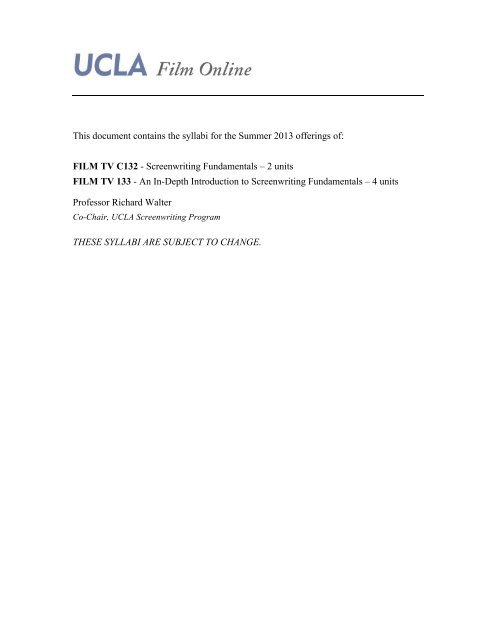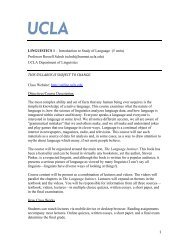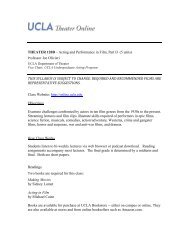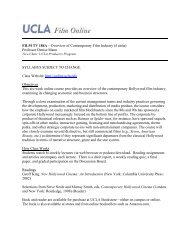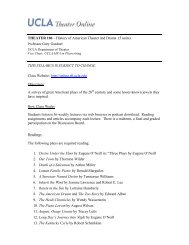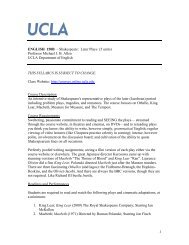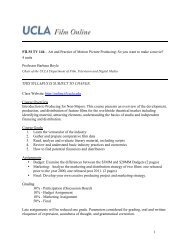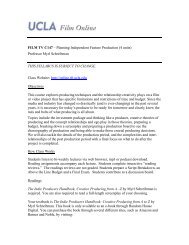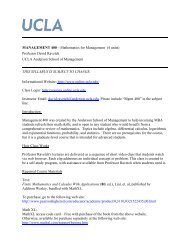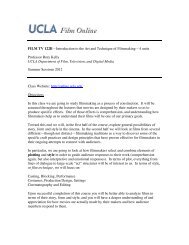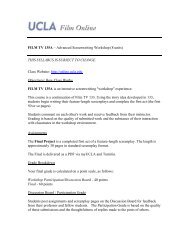These syllabi are subject to change. - UCLA Summer Sessions ...
These syllabi are subject to change. - UCLA Summer Sessions ...
These syllabi are subject to change. - UCLA Summer Sessions ...
Create successful ePaper yourself
Turn your PDF publications into a flip-book with our unique Google optimized e-Paper software.
This document contains the <strong>syllabi</strong> for the <strong>Summer</strong> 2013 offerings of:<br />
FILM TV C132 - Screenwriting Fundamentals – 2 units<br />
FILM TV 133 - An In-Depth Introduction <strong>to</strong> Screenwriting Fundamentals – 4 units<br />
Professor Richard Walter<br />
Co-Chair, <strong>UCLA</strong> Screenwriting Program<br />
THESE SYLLABI ARE SUBJECT TO CHANGE.
FILM TV C132 - Screenwriting Fundamentals – 2 units<br />
Professor Richard Walter<br />
Co-Chair, <strong>UCLA</strong> Screenwriting Program<br />
THIS SYLLABUS IS SUBJECT TO CHANGE.<br />
Class Website: http://online.tft.ucla.edu<br />
Objectives<br />
Learn the fundamentals of screenwriting—s<strong>to</strong>ry structure, character development, plot,<br />
theme, conflict, and “vision.” Emphasis is on structural analysis of feature film writing.<br />
Students will develop a professional screenwriter’s conceptual vocabulary for<br />
developing, writing and rewriting his or her own work.<br />
How Class Works<br />
Students listen <strong>to</strong> bi-weekly lectures via a web browser. Reading assignments<br />
accompany each lecture. Students complete interactive “reading reviews.” The reading<br />
reviews <strong>are</strong> not graded. The final grade is determined by a midterm and final.<br />
Readings<br />
Richard Walter's Essentials of Screenwriting: The Art, Craft, and Business of Film and<br />
Television Writing is required for this course. You <strong>are</strong> also required <strong>to</strong> read a full-length<br />
screenplay. The assigned screenplay is available for download from the Class Website.<br />
Books <strong>are</strong> available for purchase at the <strong>UCLA</strong> Books<strong>to</strong>re—either on campus or online.<br />
They <strong>are</strong> also available at s<strong>to</strong>res and from online booksellers such as Amazon.com.<br />
Screenings:<br />
Two films, titles TBA, <strong>are</strong> required viewing. Other films <strong>are</strong> recommended—not<br />
required—as companion viewing for each lesson.<br />
Recommended films can be streamed at low resolution from the Class Website. Films<br />
chosen for assignments or papers should be viewed at full quality on DVD or via web<br />
services such as iTunes or Netflix.
Assignments<br />
1 - Midterm -- Analysis of assigned screenplay – minimum 3 pages<br />
2- Final – Comparative analysis of two assigned films – 3 <strong>to</strong> 5 pages<br />
Grade Breakdown:<br />
Your final grade is calculated as follows:<br />
Midterm – 50%<br />
Final – 50%<br />
Policies<br />
This class takes advantage of my<strong>UCLA</strong> and a third-party service known as Turnitin.<br />
Submissions <strong>are</strong> screened for improper citations and potential plagiarism. Quotes or<br />
ideas paraphrased from other work must be properly cited.<br />
SCHEDULE<br />
Week One<br />
Lesson 1: Integration<br />
Reading: Essentials of Screenwriting, Introduction, Pages 3 - 32<br />
Lecture: It’s All About S<strong>to</strong>ry<br />
Suggested Viewing: Back <strong>to</strong> the Future, Directed by Robert Zemeckis, 1985<br />
Star Wars, Directed by George Lucas, 1977<br />
Lesson 2: Theme and Conflict<br />
Reading: Essentials of Screenwriting, Pages 33 – 57<br />
Lecture: Avoid The Village of the Happy Nice People<br />
Suggested Viewing: Kramer vs. Kramer, Directed by Robert Ben<strong>to</strong>n, 1979<br />
Tootsie, Directed by Sydney Pollack, 1982<br />
Week Two<br />
Lesson 3: S<strong>to</strong>ry Assembly: Part One<br />
Reading: Essentials of Screenwriting, Pages 58 – 71<br />
Lecture: Beginnings
Suggested Viewing:<br />
American Graffiti, Directed by George Lucas, 1973<br />
The Big Chill, Directed by Lawrence Kasdan, 1983<br />
Jurassic Park, Directed by Steven Spielberg, 1993<br />
Lesson 4: S<strong>to</strong>ry Assembly: Part Two<br />
Reading: Essentials of Screenwriting, Pages 71 - 83<br />
Lecture: Middles and Endings<br />
Suggested Viewing:<br />
Do the Right Thing, Directed by Spike Lee, 1989<br />
Thelma and Louise, Directed by Ridley Scott, 1991<br />
Week Three<br />
Lesson 5: Character<br />
Reading: Essentials of Screenwriting, Pages 83 – 94<br />
Lecture: No Stereotypes Allowed<br />
Work on Midterm Assignment<br />
Suggested Viewing:<br />
The Bridge on the River Kwai, Directed by David Lean, 1957<br />
Moonstruck, Directed by Norman Jewison, 1987<br />
Lesson 6: Dialogue<br />
Reading: Essentials of Screenwriting, Pages 95 – 119<br />
Lecture: Lights, Camera… Talk?<br />
Suggested Viewing:<br />
12 Angry Men, Directed by Sidney Lumet, 1957<br />
Annie Hall, Directed by Woody Allen, 1977<br />
Pat<strong>to</strong>n, Directed by Franklin J. Schaffner, 1970<br />
Week Four<br />
Lesson 7: Action and Setting/Format<br />
Reading: Essentials of Screenwriting, Pages 120 – 164<br />
Lecture: Think Outside of the Restaurant<br />
Suggested Viewing:<br />
Big Night, Directed by Campbell Scott and Stanley Tucci, 1996
Inglourious Basterds, Directed by Quentin Tarantino, 2009<br />
Running on Empty, Directed by Sidney Lumet, 1988<br />
ASSIGNMENT DUE: Midterm<br />
Week Five<br />
Lesson 8: Notes on Notes<br />
Reading: Essentials of Screenwriting, Pages 165 – 207<br />
Lecture: Analysis of “The Hangover” screenplay by Jon Lucas & Scott Moore<br />
Suggested Viewing:<br />
The Hangover, Directed by Todd Phillips, 2009<br />
Lesson 9: Craft<br />
Reading: Essentials of Screenwriting, Pages 211-259<br />
Lecture: Outlines and Treatments and Scene Cards! Oh my!<br />
Suggested Viewing:<br />
Adaptation, Directed by Spike Jonze, 2002<br />
Terms of Endearment, Directed by James L. Brooks, 1983<br />
Play Misty for Me, Directed by Clint Eastwood, 1971<br />
Week Six<br />
Lesson 10: The Business of Screenwriting<br />
Reading: Essentials of Screenwriting, Pages 263-376 (Optional)<br />
Lecture: They Don’t Call It Show-Art<br />
Suggested Viewing:<br />
Highlander, Directed by Russell Mulcahy, 1986<br />
River’s Edge, Directed by Tim Hunter, 1986<br />
ASSIGNMENT DUE: Final due on the last day of the term.
FILM TV 133 - An In-Depth Introduction <strong>to</strong> Screenwriting Fundamentals (4 units)<br />
Professor Richard Walter<br />
Co-Chair, <strong>UCLA</strong> Screenwriting Program<br />
THIS SYLLABUS IS SUBJECT TO CHANGE.<br />
Class Website: http://online.tft.ucla.edu<br />
Objectives<br />
Learn the fundamentals of screenwriting -- s<strong>to</strong>ry structure, character development, plot,<br />
theme, conflict, and “vision.”<br />
Students work with TAs and classmates <strong>to</strong> develop an original s<strong>to</strong>ry for a full-length<br />
screenplay, guided by lectures, readings, classmate feedback and TA instruction.<br />
Emphasis is on structural analysis of feature film writing. Students will develop a<br />
professional screenwriter’s conceptual vocabulary for developing, writing and rewriting<br />
his or her own work.<br />
How Class Works<br />
Students listen <strong>to</strong> bi-weekly lectures via a web browser. Reading assignments<br />
accompany each lecture. Students complete interactive “reading reviews.” The reading<br />
reviews <strong>are</strong> not graded. Questions and exercises related <strong>to</strong> assignments and creative work<br />
<strong>are</strong> workshopped on a moderated Discussion Board. There <strong>are</strong> three written assignments.<br />
Readings<br />
Richard Walter's Essentials of Screenwriting: The Art, Craft, and Business of Film and<br />
Television Writing is required for this course. You <strong>are</strong> also required <strong>to</strong> read a full-length<br />
screenplay. The assigned screenplay is available for download from the Class Website.<br />
Books <strong>are</strong> available for purchase at the <strong>UCLA</strong> Books<strong>to</strong>re—either on campus or online.<br />
They <strong>are</strong> also available at s<strong>to</strong>res and from online booksellers such as Amazon.com.
Screenings:<br />
Recommended films can be streamed at low resolution from the Class Website. Films<br />
chosen for assignments or papers should be viewed at full quality on DVD or via web<br />
services such as iTunes or Netflix.<br />
Assignments<br />
1 - Screenplay Notes – read and analyze a produced full-length screenplay<br />
2 - Screenplay Profile – 1 page treatment of your s<strong>to</strong>ry for an original screenplay<br />
3 - Final – expanded treatment (3 <strong>to</strong> 5 pages) and 10 pages of screenplay<br />
Note:<br />
Students planning <strong>to</strong> write the first act of their feature script in (135A) Advanced<br />
Screenwriting Workshop in Session C should email their TA at the start of class <strong>to</strong><br />
discuss ways <strong>to</strong> maximize their preparation for advanced work.<br />
Grade Breakdown:<br />
Your final grade is calculated on a point scale, as follows:<br />
Participation/Discussion Board - 30 points<br />
Screenplay Profile - 10 points<br />
Screenplay Notes - 20 points<br />
Final - 40 points<br />
Discussion Board<br />
The Participation grade is based on contributions <strong>to</strong> the Discussion Board.<br />
The ex<strong>change</strong> of ideas on the Discussion Board is between you and your classmates.<br />
Your TA is both modera<strong>to</strong>r and active contribu<strong>to</strong>r. He or she will reinforce concepts<br />
introduced in lecture and readings and assign exercises <strong>to</strong> advance the development of<br />
individual student s<strong>to</strong>rylines.<br />
Weekly Discussion Board Questions<br />
Your instruc<strong>to</strong>r posts 2 questions on the Discussion Board every Monday:<br />
Question 1 – refers <strong>to</strong> material covered in the lectures and required reading<br />
Question 2 – engages classmates in the development of their individual screenplays<br />
You must answer both questions. You <strong>are</strong> encouraged <strong>to</strong> respond <strong>to</strong> the posts of others.
Guidelines for Posting<br />
<strong>These</strong> <strong>are</strong> not Discussion Board posts as you know them. They <strong>are</strong> mini-essays.<br />
Proper written English is required. You must make an argument and support it with<br />
references <strong>to</strong> the readings, lecture and clips. Examples from your own independent<br />
study or experience <strong>are</strong> appropriate if they advance your argument. You <strong>are</strong> graded on<br />
substance, not length. Write what you need <strong>to</strong> make your point.<br />
Evaluation of Posts<br />
Posts <strong>are</strong> evaluated on both individual merit and the contribution they make <strong>to</strong> the<br />
unfolding discussion. Timely posting is required, but avoiding late posts is not the key <strong>to</strong><br />
a good participation grade. Instead, keep the following in mind:<br />
- be a presence on the board, have a voice, be memorable, an active citizen<br />
- posting early in the week increases the chances of getting helpful feedback<br />
- lively, thoughtful posts can help your grade overall<br />
and:<br />
- posts in response <strong>to</strong> a previous week’s questions <strong>are</strong> not likely <strong>to</strong> be read by your TA<br />
- posts <strong>are</strong> not time-stamped; LATE means you left no impression on your TA that week<br />
- TAs only tally posts and deadlines met if a final grade needs help<br />
Policies<br />
This class takes advantage of my<strong>UCLA</strong> and a third-party service known as Turnitin.<br />
Submissions <strong>are</strong> screened for improper citations and potential plagiarism. Quotes or<br />
ideas paraphrased from other work must be properly cited.<br />
SCHEDULE<br />
Week One<br />
Lesson 1: Integration<br />
Reading: Essentials of Screenwriting, Introduction, Pages 3 - 32<br />
Lecture: It’s All About S<strong>to</strong>ry<br />
Suggested Viewing:<br />
Back <strong>to</strong> the Future, Directed by Robert Zemeckis, 1985<br />
Star Wars, Directed by George Lucas, 1977<br />
Lesson 2: Theme and Conflict<br />
Reading: Essentials of Screenwriting, Pages 33 – 57
Lecture: Avoid The Village of the Happy Nice People<br />
Suggested Viewing:<br />
Kramer vs. Kramer, Directed by Robert Ben<strong>to</strong>n, 1979<br />
Tootsie, Directed by Sydney Pollack, 1982<br />
Week Two<br />
Lesson 3: S<strong>to</strong>ry Assembly: Part One<br />
Reading: Essentials of Screenwriting, Pages 58 – 71<br />
Lecture: Beginnings<br />
Suggested Viewing:<br />
American Graffiti, Directed by George Lucas, 1973<br />
The Big Chill, Directed by Lawrence Kasdan, 1983<br />
Jurassic Park, Directed by Steven Spielberg, 1993<br />
Lesson 4: S<strong>to</strong>ry Assembly: Part Two<br />
Reading: Essentials of Screenwriting, Pages 71 - 83<br />
Lecture: Middles and Endings<br />
Suggested Viewing:<br />
Do the Right Thing, Directed by Spike Lee, 1989<br />
Thelma and Louise, Directed by Ridley Scott, 1991<br />
Week Three<br />
Lesson 5: Character<br />
Reading: Essentials of Screenwriting, Pages 83 – 94<br />
Lecture: No Stereotypes Allowed<br />
Work on Midterm Assignment<br />
Suggested Viewing:<br />
The Bridge on the River Kwai, Directed by David Lean, 1957<br />
Moonstruck, Directed by Norman Jewison, 1987<br />
Lesson 6: Dialogue<br />
Reading: Essentials of Screenwriting, Pages 95 – 119<br />
Lecture: Lights, Camera… Talk?
Suggested Viewing:<br />
12 Angry Men, Directed by Sidney Lumet, 1957<br />
Annie Hall, Directed by Woody Allen, 1977<br />
Pat<strong>to</strong>n, Directed by Franklin J. Schaffner, 1970<br />
Week Four<br />
Lesson 7: Action and Setting/Format<br />
Reading: Essentials of Screenwriting, Pages 120 – 164<br />
Lecture: Think Outside of the Restaurant<br />
Suggested Viewing:<br />
Big Night, Directed by Campbell Scott and Stanley Tucci, 1996<br />
Inglourious Basterds, Directed by Quentin Tarantino, 2009<br />
Running on Empty, Directed by Sidney Lumet, 1988<br />
ASSIGNMENT DUE: Midterm<br />
Week Five<br />
Lesson 8: Notes on Notes<br />
Reading: Essentials of Screenwriting, Pages 165 – 207<br />
Lecture: Analysis of “The Hangover” screenplay by Jon Lucas & Scott Moore<br />
Suggested Viewing:<br />
The Hangover, Directed by Todd Phillips, 2009<br />
Lesson 9: Craft<br />
Reading: Essentials of Screenwriting, Pages 211-259<br />
Lecture: Outlines and Treatments and Scene Cards! Oh my!<br />
Suggested Viewing:<br />
Adaptation, Directed by Spike Jonze, 2002<br />
Terms of Endearment, Directed by James L. Brooks, 1983<br />
Play Misty for Me, Directed by Clint Eastwood, 1971
Week Six<br />
Lesson 10: The Business of Screenwriting<br />
Reading: Essentials of Screenwriting, Pages 263-376 (Optional)<br />
Lecture: They Don’t Call It Show-Art<br />
Suggested Viewing:<br />
Highlander, Directed by Russell Mulcahy, 1986<br />
River’s Edge, Directed by Tim Hunter, 1986<br />
ASSIGNMENT DUE: Final


